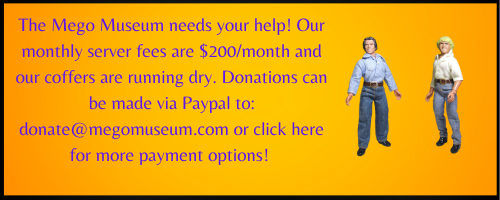I have no beef with teh law at all. I just want to know the score.
If I choose to do something illegal i just want to know. I have NEVER complained to a police officer for enforcing the law be it a traffic ticket or getting caught throwing snowballs at the FireChiefs car. ( we didnt know).
Thank you for helping remind me to keep an eye out but . . this is the Mego Museum Forum! If a cop had to track me HERE to bust me for something I would be the one poking fun of him.
out but . . this is the Mego Museum Forum! If a cop had to track me HERE to bust me for something I would be the one poking fun of him. 
( To be honest I sometimes am disapointed there arent more Mego fans. Seems small here. Mego has a lot of Love. Maybe theres just a lot of Non Posters)
If I choose to do something illegal i just want to know. I have NEVER complained to a police officer for enforcing the law be it a traffic ticket or getting caught throwing snowballs at the FireChiefs car. ( we didnt know).
Thank you for helping remind me to keep an eye
 out but . . this is the Mego Museum Forum! If a cop had to track me HERE to bust me for something I would be the one poking fun of him.
out but . . this is the Mego Museum Forum! If a cop had to track me HERE to bust me for something I would be the one poking fun of him. 
( To be honest I sometimes am disapointed there arent more Mego fans. Seems small here. Mego has a lot of Love. Maybe theres just a lot of Non Posters)





 I think I'll stop. Even if it is legal . Just feel indecisive about it.
I think I'll stop. Even if it is legal . Just feel indecisive about it. 
 How should I feel about watching the Twilight Zone straight Through? Or I have over a hundred dollars worth of graphic novels I didnt pay for?
How should I feel about watching the Twilight Zone straight Through? Or I have over a hundred dollars worth of graphic novels I didnt pay for?  I remeber my comics very well. I have bascialyy "copied' the graphic novels I check out into my mind. And I see no reason to buy them now.
I remeber my comics very well. I have bascialyy "copied' the graphic novels I check out into my mind. And I see no reason to buy them now.  Another thing. One Thirsday a month the Libary has a "Foriegn Movie Night" I can go watch a film with a group of other folks in thier meeting room.
Another thing. One Thirsday a month the Libary has a "Foriegn Movie Night" I can go watch a film with a group of other folks in thier meeting room.
Comment